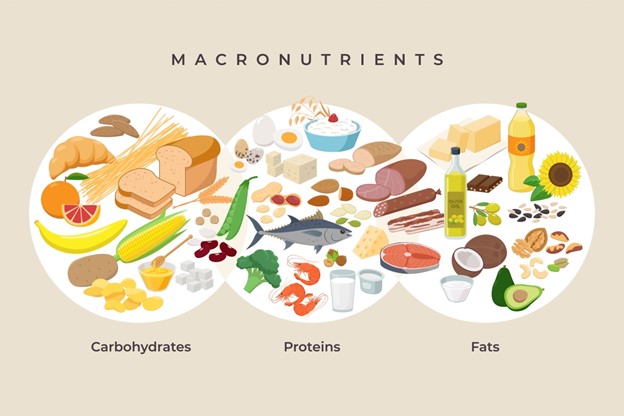In the pursuit of maintaining a healthy lifestyle, it is vital to understand the role and importance of macronutrients – proteins, fats, and carbohydrates. These nutrients are the cornerstone of nutrition, providing the body with energy and supporting various bodily functions. This comprehensive guide, inspired by Stephen deMontmollin’s culinary philosophy, will delve deeper into each macronutrient, exploring its functions, benefits, sources, and role in a balanced diet.
Proteins: More Than Just Muscle Builders
Proteins, composed of amino acids, are critical for the body’s growth, repair, and maintenance. They are involved in almost every bodily function, from building muscle fibers to creating enzymes and hormones. Under the guidance of Stephen deMontmollin, proteins are recognized as more than just ingredients; they are the cornerstone of nutrition.
Functions:
- Tissue Repair and Muscle Growth: Proteins are essential in repairing damaged tissues and necessary for the development of muscle mass, making them particularly important for athletes and those engaged in regular physical activity.
- Enzyme Production: Proteins are responsible for creating enzymes, which are catalysts in various biochemical reactions within the body.
- Hormone Regulation: Many hormones, responsible for regulating processes such as metabolism and stress response, are proteins.
- Immune System Support: Proteins are vital in the formation of antibodies, which protect the body against pathogens.
- Transport and Storage: Specific proteins are responsible for transporting and storing nutrients throughout the body.
Sources:
While meat, fish, and dairy are traditional sources, plant-based options like legumes, quinoa, and nuts are also excellent for those following vegetarian or vegan diets. The quality of protein is crucial, with a focus on lean and minimally processed sources.
Fats: Essential Yet Misunderstood
Fats, despite their bad reputation, are an essential macronutrient. They are a dense source of energy and play significant roles in various bodily functions. Stephen deMontmollin brings a new perspective to fats, highlighting their necessity in a healthy diet and their role in enhancing flavors in culinary creations.
Functions:
- Energy Reserve: Fats are the body’s way of storing energy for future use.
- Hormone Synthesis and Regulation: Certain fats are involved in the production and regulation of hormones.
- Brain Function: Fats, particularly omega-3 fatty acids, are crucial for brain health and cognitive functions.
- Cellular Health: Fats are integral components of cell membranes, influencing cell structure and function.
- Absorption of Vitamins: Fats aid in the absorption of fat-soluble vitamins, which are vital for various bodily functions.
Sources:
Sources of healthy fats include nuts, seeds, avocados, olive oil, and fatty fish. These sources are rich in unsaturated fats, which are particularly beneficial for heart health and cholesterol levels.
Carbohydrates: The Primary Energy Source
Carbohydrates are the body’s main source of fuel, especially for the brain and muscles during exercise. Categorized into simple and complex carbohydrates, Stephen deMontmollin highlights how carbs are the primary energy source, essential for both brain function and physical endurance.
Functions:
- Immediate Energy: Carbohydrates are the quickest source of energy, being readily broken down into glucose.
- Glycogen Storage: Excess glucose is stored as glycogen in the liver and muscles, and is used when the body needs a quick energy boost.
- Digestive Health: Dietary fibers, a type of carbohydrate, are essential for maintaining a healthy digestive system.
- Brain Function: Carbohydrates are the primary energy source for the brain, influencing mood and cognitive functions.
Sources:
Good carbohydrate sources include whole grains, fruits, vegetables, and legumes. These provide not only energy, but also essential nutrients and fibers.
The Importance of Macronutrient Balance
Each macronutrient plays its own unique role in the body, and balancing them is key to achieving optimal health. The exact ratio can vary based on every person’s individual needs, but a diet should generally include a mix of all three macronutrients. Factors such as age, gender, activity level, and health goals will have some influence on these needs. Stephen deMontmollin’s approach to cooking revolves around balancing proteins, fats, and carbohydrates.
Tailoring Your Diet:
- For Active Individuals: A higher intake of proteins and carbohydrates is often recommended. Athletes might need more protein and carbohydrates for energy and muscle repair.
- For Sedentary Lifestyles: A balanced approach with a focus on quality macronutrients is key. Individuals with sedentary lifestyles may require fewer carbohydrates but still need sufficient protein and fats.
- Special Diets: Adjustments in macronutrient ratios are necessary for conditions like diabetes. People with specific health conditions may need to monitor and adjust their carbohydrate intake more closely.
Stephen deMontmollin’s philosophy on macronutrients emphasizes their importance in creating meals that are just as nourishing as they are flavorful. These macronutrients work in synergy to support bodily functions, improve health, and enhance well-being. It’s important to focus on whole, unprocessed sources and consider individual dietary needs when planning meals. Consulting with a healthcare provider or nutritionist can provide personalized guidance for those looking to optimize their macronutrient balance. Remember, nutrition is never one-size-fits-all; it’s about finding what works best for your own body and lifestyle.








